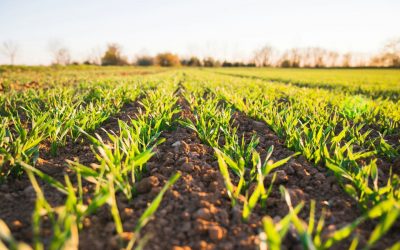The British Society of Soil Science (BSSS) recommends to governments that long-term financial incentives are introduced to encourage sustainable soil management practices, particularly in a bid to store soil carbon.
Soils contain more carbon than in the atmosphere and vegetation combined and are therefore an essential carbon store. Increasing soil organic carbon content through sustainable soil management (or regenerative agricultural) practices, can improve soil health, the efficiency of food production and water quality. As carbon gains can be easily lost, affecting efficient soil usage, the note recommends that any incentives to support farmers and other land-owners to sequester carbon, are made over the long-term.
Sustainable soil management, often known as regenerative agricultural practices, includes reducing the amount of tillage (ploughing the soil), planting ‘cover crops’ to cover the soil throughout the year and between cropping plants and introducing organic material to existing soils. The note also encourages smaller land-owners and gardeners to introduce these practices on their land to increase the amount of carbon in their soil.
Further recommendations include protecting existing carbon stores in permanent grasslands, moorlands, peatlands, wetlands and woodlands and carefully considering the application of rock dust or biochar, to ensure they do not negatively impact on soil quality through pH change.
As the national Society which brings together academic and professional soil science experts, the Society’s recommendations are based on current science.
Dr Paul Newell Price, Chair of the group which developed the note said, ““As we launch this science note in time for COP 26, we hope it provides some clarity around the challenges of protecting and increasing soil carbon levels, and highlights how farmers and land managers could be supported to improve soil health and assist with efforts to mitigate and adapt to climate change.”
The Science Note: Soil Carbon is available as a technical, fully referenced document and as a short, summary document via: https://soils.org.uk/education/guidance-and-science-notes/.
Ends
——————————————————————————————————————————————————————————————————————————————–
Media Contact
Sarah Garry
Executive Officer
British Society of Soil Science
Email: exec@soils.org.uk
Notes for Editors
- The British Society of Soil Science (BSSS) is an established international membership organisation and charity committed to the study of soil in its widest aspects. The society brings together those working within academia, and practitioners implementing soil science in industry. Soil scientists’ research findings are essential for investigating the feasibility of agricultural, landscaping, construction, conservation and archaeological projects. Our members are employed by both private and public sector institutions including academic universities, conservation charities, construction companies and consultancies.
- The full, technical Science Note: Soil Carbon can be accessed at: https://soils.org.uk/wp-content/uploads/2022/05/BSSS_Science-Note_Soil-Carbon_Final_May22_75YRS_DIGITAL.pdf
- The short, summary Science Note: Soil Carbon is available at: https://soils.org.uk/wp-content/uploads/2022/05/BSSS_Science-Note_Soil-Carbon_Short-Version_Final_May22_75YRS_DIGITAL.pdf
- Thank you to the contributors to the Science Note: Soil Carbon: Paul Newell Price, M. Fernanda Aller, Anne Bhogal, Deborah Crossan, Lorna Dawson, Andy Gregory, Lewis Peake and David Tompkins.




